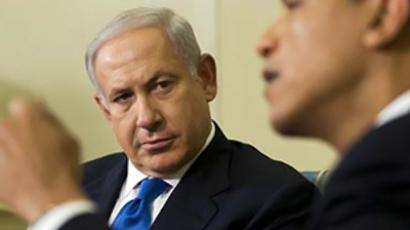One-on-one Middle East peace process may change to one-on-57

With Arab leaders offering Israel peace with the entire Moslem world, Israeli Prime Minister Benjamin Netanyahu is expected to explore that option in his first meeting with President Barack Obama next week in Washington.
Until now, Israel had been focused on the narrow and problematic peace track with the Palestinians. However, some Arab leaders suggest it will be easier to arrive at an Israel-Palestinian agreement within the context of a broad peace involving all 57 Moslem nations. Netanyahu appeared to be inclining in this direction when he met with Egyptian President Hosni Mubarak Monday and said that the Jewish people wanted “harmonious relations with the Moslem world”. At the meeting in Egypt, Netanyahu said “Israel yearns to reach peace with its Palestinian neighbors and with all the Arab nations. We all live in this region and we are all the sons of Abraham.”
The much anticipated meeting between Netanyahu and Obama is expected to lay down the first clear marker on the direction of the Middle East peace process in the coming years. Obama has strongly
indicated his intention to pursue the process vigorously and not to let it wither as it has in recent years. He has also spoken approvingly of the Saudi-initiated Arab Peace Plan which calls for Israel’s
withdrawal to the pre-Six Day War borders in return for peace with the Arab world. However Obama did not specifically endorse all the plan’s provisions.
Netanyahu has until now rejected several of its key elements, including withdrawal from the Golan Heights, the return of Palestinian refugees to Israel and the establishment of a Palestinian capital in east Jerusalem. It is not clear how the two leaders will propose resolving these issues.
The London-based Arabic language daily Al-Quds al-Arabi reported last week that at Obama’s request the Arab League is currently in the process of revising the peace plan to make it more amenable to Israel. The revisions would reportedly stipulate that a future Palestinian state be demilitarized and, in a major concession, the Palestinians would forfeit the right of refugees to return to Israel proper. Instead, some of the refugees would be resettled in the Palestinian state to be established on the West Bank and Gaza Strip and the rest would be absorbed in the Arab states where they are presently dwelling. Such changes would go a long way to softening Israeli reservations about the plan but Arab League Secretary-Geneal Amr Mussa denied the report yesterday. There will be “no sweetening” of the plan for Israel, he said.
In an interview with the Times of London, Jordan’s King Abdullah said the entire Moslem world, from Morocco to Indonesia, would recognize the Jewish state if it accepted the Arab peace plan.
“We are offering a third of the world to meet them with open arms,” said the monarch, whose late father, King Hussein, signed a peace agreement with Israel in 1994. Abdullah warned, however, that there could be another war within a year and a half if Israel rejects the peace initiative.
Since the Oslo accords 15 years ago in which Israel and the Palestine Liberation Organization headed by Yasser Arafat began a fitful peace process, the process, such as it is, has been largely confined to this narrow track which has led only to dead ends. Whether a regional approach can overcome this deadlock is a major unknown.
Netanyahu’s recent election appeared to mean a retreat from even the theoretical possibility of peace with the Palestinians because of his outright rejection of a two-state solution in which an independent Palestinian state would exist alongside Israel. Instead, he suggested building up the Palestinian economy and its institutions to the point of self-government but not sovereignty.
It is considered possible, perhaps likely, that he will feel obliged in his meeting with Obama to shift his position. “He will have to clearly accept the two-state principle and commit himself to the civic, economic and security development of the Palestinian Authority,” wrote analyst Gidi Grinstein in Ha’aretz this week.
Abraham Rabinovich for RT












